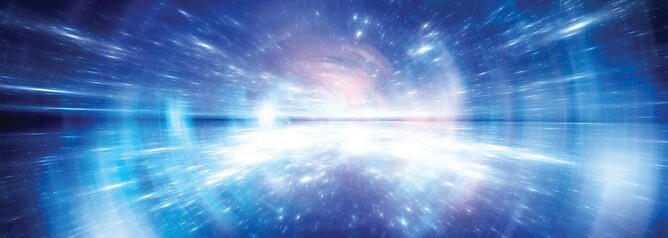Scientists tell us the ‘Big Bang’ supposedly started from hydrogen and helium 13.7 billion years ago (and who made those two elements?). The other elements apparently came from the birth and death of stars. Through evolutionary processes Man somehow eventually popped up. After an explosion, the scattered pieces usually slow down and stop — but our post-‘big bang’ universe is continuing to expand AND is accelerating in its expansion, and the scientists don’t know why ‘dark matter’ has this effect, nor indeed what it is exactly. The nihilistic physicist, who sees an ever-expanding universe as an indicator that humanity is only a speck on the universal timeline, cannot offer any hope — regardless of how Prof Brian Cox spins it. If there really is nothing else for us except the here-and-now, or the next few centuries, why do we bother thinking of others, why aren’t our actions purely dictated by selfishness? What does any form of sacrifice achieve in a purposeless universe? Why is humanity so precious if it’s just some ‘happy accident’ that will blow away like stardust? Existentialists believe that existence precedes essence, that life only has meaning through what we do — that there is no significance to who we are outside of our actions or experiences. But if our existence is ultimately meaningless, it is then nonsensical to say that when we know time is short we should treasure it more. To appreciate something only makes sense if there’s a reason to value what we have. For example, surely we must value God’s beautiful creation in order to have the desire to preserve it. If we don’t care about something, why would we protect, defend or save it?
As a product of the Age of Enlightenment and Darwinian evolutionary theory, many existentialists believe in a godless world of chance, where if there’s to be any meaning you have to find it or make it yourself. The existentialist says, “There is no god controlling you, you have the freedom to be the master of your life — own it. Destiny is not thrust upon you; you have to create your own meaningful existence in a meaningless world.” Taking this thesis to its natural conclusion, if what I have to expect after death is nothing anyway, why shouldn’t I live my life as recklessly and selfishly as I want to experience it, since nothing lasts and no one cares more for me than I do? If what I have to expect after death is nothing anyway, why would I not choose that immediately rather than go through months or years of suffering from a terminal or debilitating illness before facing a pointless fate? Euthanasia makes perfect sense with that world view. If my unwanted foetus is going to suffer years of neglect and resentment before nothing, why wait? Abortion makes perfect sense with that world view — even if one is supposedly ‘thinking for’ the welfare of the foetus in saying ‘no one is going to treasure it anyway’. Such ‘freedom’ to do whatever we want, in reality, is no freedom at all — it is actually a futile and meaningless existence in a meaningful world created and nurtured by God. I thank God that in His ordered universe I have restricted freedom — that doesn’t make me a robot, I can still exercise my will — because the limitations are set by my loving Creator Who knows me and what’s best for me.
Have you felt limited by God? Is His control burdensome to you? Or do you feel loved and protected by the Creator?
Editorial by Andrew Chan


